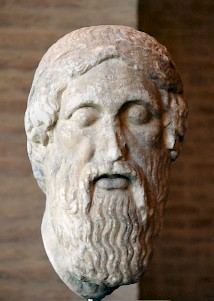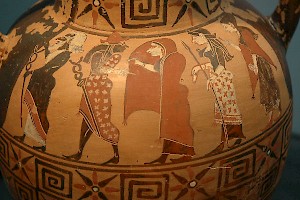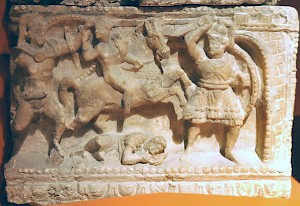Cypria
Epic Cycle (᾽Επικὸς κύκλος): set of twelve archaic epic poems, known to every educated Greek. The best-known were Homer's Iliad and Odyssey, which are also the only epics that have survived.
Summary

The Cypria is the fifth epic of the Epic Cycle; it is attributed to Stasinus, Homer, or Hegesias, and is pretty well-known because we have a long excerpt and various quotes. It tells the events leading up to the Trojan War, and describes everything that happened before the beginning of the Iliad. "Cypria" is one of the titles of Aphrodite, who sets the train of events in motion.
The story begins with the marriage of Peleus and Thetis, which ends in a quarrel when the uninvited goddess of Strife, Eris, throws a golden apple to the guests with the inscription "for the most beautiful". The goddesses Hera, Athena, and Aphrodite all claim that they should have this object, and decide to ask the Trojan prince Paris to be the judge in their beauty contest. He cannot make a choice, but Aphrodite promises him the most beautiful wife in the world, and the judge awards her the prize.

Aphrodite now orders Paris to build a ship and sail to Greece, where the most beautiful woman in the world lives: Helen, wife of king Menelaus of Sparta. During a big feast, Paris offers presents to his Greek hosts, but the king announces that he has to visit Crete, ordering his wife to furnish her guest with everything he might need. Aphrodite arranges that Helen falls in love with Paris, and they decide to leave Sparta, taking Menelaus' treasures with them. A big storm, caused by Hera, brings them to Sidon in Phoenicia. Paris captures the city, but the adulterous couple does not stay there; instead they decide to go to Troy, where a wedding is celebrated.
Meanwhile, Iris, the messenger of the gods, has explained to Menelaus what has happened during his absence. He returns from Crete and visits his brother Agamemnon, the king of Mycene and the informal leader of all Greeks. They decide to launch an attack on Troy, together with all other Greek kings. Nestor helps Menelaus gather the other warriors, which leads to some problems when they meet Odysseus, who appears to be mad: he has yoked an oxen and a donkey to plow, and is sowing precious salt. One of the Greeks, Palamedes, recognizes that Odysseus has little lust for war, takes Odysseus' baby son Telemachus, puts him into the path of the animals, and forces Odysseus to turn aside - revealing that he is not mad. (It turns out that he has learned that it will last ten years, and that he will return ten years later.)
The expeditionary force, more than a thousand ships, gathers at Aulis, where the soldiers see how a snake devours eight young birds; the seer Calchas explains that this means that the war will take nine full years. Undeterred, the armada leaves and reaches Teuthrania, which the Greeks believe to be Troy, and sack. They set out for sea, but a storm scatters them. Achilles lands on Skyros, where he marries Deidameia. He also meets king Telephus of Teuthrania. Achilles had wounded this man, but an oracle has told him that he would be cured by the weapon that had hurt him, which is indeed what happens. Grateful for his cure, Telephus promises to lead the Greeks to the real Troy.
Several years later, the Greek navy gathers again at Aulis, but now it encounters adverse winds. Agamemnon overcomes this problem by sacrificing his daughter Iphigeneia to Artemis. The goddess, however, intervenes by taking away the girl and putting a stag on the altar in her place.
Sailing to Troy, the Greeks reach the isle of Tenedos, where Philoctetes is bitten by a snake. The stench of the wound is too much to bear, so the Greeks abandon him.
Yet, they are now close to Troy. An oracle has announced that the first to land will also be the first to be killed; Protesilaus is the luckless victim of Hector, Troy's mighty crown prince. But the Greeks have now landed, and in the first battle, Achilles kills Cycnus. The Greeks bury the first dead, build a camp on the beach, and send an embassy to Troy, demanding the extradition of Helen, and the return of Menelaus' treasure. This is refused and the Greeks try to storm the city - and fail to take it. As was common in Antiquity, this immediately means that they try to starve it, denying the Trojans access to their lands. Neighboring towns are destroyed.

At this point, the Cypria contains a little-known scene: Achilles wants to have a meeting with Helen, which is arranged by Aphrodite and Thetis. Apparently, he is impressed and falls in love, because in the next scene, when Palamedes proposes to return home, he restrains the Greeks who accept this idea. The story continues with several scenes in which Achilles acts brilliantly: he seizes the cattle of Aeneas, sacks several towns (including Pedasus), and kills the Trojan prince Troilus. This scene was included in the Cypria, but is better known from many artistic representations from the Archaic Period, suggesting that what is now almost forgotten, was once one of the central stories of the Trojan legend.
The final scenes of the Cypria are a bridge to the Iliad, and prove that it was composed after Homer's work. We hear how Odysseus avenges himself upon Palamedes: he is drowned when he has gone out fishing. This scene is included to explain Palamedes' absence from the Iliad. The Cypria ends with an expedition to the southern Troad, and the division of the spoils. Agamemnon receives the girl Chryseis and Achilles receives Briseis.
Proclus' excerpt
This is continued by the epic called Cypria which is current in eleven books. Its contents are as follows.
Zeus plans with Themis to bring about the Trojan War. Strife arrives while the gods are feasting at the marriage of Peleus and starts a dispute between Hera, Athena, and Aphrodite as to which of them is fairest. The three are led by Hermes at the command of Zeus to Alexandrus [Paris] on Mount Ida for his decision, and Alexandrus, lured by his promised marriage with Helen, decides in favor of Aphrodite.
Then Alexandrus builds his ships at Aphrodite's suggestion, and Helenus foretells the future to him, and Aphrodite orders Aeneas to sail with him, while Cassandra prophesies as to what will happen afterwards. Alexandrus next lands in Lacedaemon and is entertained by the sons of Tyndareus, and afterwards by Menelaus in Sparta, where in the course of a feast he gives gifts to Helen.
After this, Menelaus sets sail for Crete, ordering Helen to furnish the guests with all they require until they depart. Meanwhile, Aphrodite brings Helen and Alexandrus together, and they, after their union, put very great treasures on board and sail away by night. Hera stirs up a storm against them and they are carried to Sidon, where Alexandrus takes the city. From there he sailed to Troy and celebrated his marriage with Helen.
In the meantime Castor and Polydeuces, while stealing the cattle of Idas and Lynceus, were caught in the act, and Castor was killed by Idas, and Lynceus and Idas by Polydeuces. Zeus gave them immortality every other day.
Iris next informs Menelaus of what has happened at his home. Menelaus returns and plans an expedition against Ilium with his brother, and then goes on to Nestor. Nestor in a digression tells him how Epopeus was utterly destroyed after seducing the daughter of Lycus, and the story of Oedipus, the madness of Heracles, and the story of Theseus and Ariadne. Then they travel over Hellas and gather the leaders, detecting Odysseus when he pretends to be mad, not wishing to join the expedition, by seizing his son Telemachus for punishment at the suggestion of Palamedes.
All the leaders then meet together at Aulis and sacrifice. The incident of the serpent and the sparrows takes place before them, and Calchas foretells what is going to befall. After this, they put out to sea, and reach Teuthrania and sack it, taking it for Ilium. Telephus comes out to the rescue and kills Thersander the son of Polyneices, and is himself wounded by Achilles. As they put out from Mysia a storm comes on them and scatters them, and Achilles first puts in at Scyros and marries Deïdameia, the daughter of Lycomedes, and then heals Telephus, who had been led by an oracle to go to Argos, so that he might be their guide on the voyage to Ilium.
When the expedition had mustered a second time at Aulis, Agamemnon, while at the chase, shot a stag and boasted that he surpassed even Artemis. At this the goddess was so angry that she sent stormy winds and prevented them from sailing. Calchas then told them of the anger of the goddess and bade them sacrifice Iphigeneia to Artemis. This they attempt to do, sending to fetch Iphigeneia as though for marriage with Achilles. Artemis, however, snatched her away and transported her to the Tauri, making her immortal, and putting a stag in place of the girl upon the altar.
Next they sail as far as Tenedos: and while they are feasting, Philoctetes is bitten by a snake and is left behind in Lemnos because of the stench of his sore. Here, too, Achilles quarrels with Agamemnon because he is invited late. Then the Greeks tried to land at Ilium, but the Trojans prevent them, and Protesilaus is killed by Hector. Achilles then kills Cycnus, the son of Poseidon, and drives the Trojans back. The Greeks take up their dead and send envoys to the Trojans demanding the surrender of Helen and the treasure with her. The Trojans refusing, they first assault the city, and then go out and lay waste the country and cities round about. After this, Achilles desires to see Helen, and Aphrodite and Thetis contrive a meeting between them. The Achaeans next desire to return home, but are restrained by Achilles, who afterwards drives off the cattle of Aeneas, and sacks Lyrnessus and Pedasus and many of the neighboring cities, and kills Troïlus. Patroclus carries away Lycaon to Lemnos and sells him as a slave, and out of the spoils Achilles receives Briseïs as a prize, and Agamemnon Chryseïs. Then follows the death of Palamedes, the plan of Zeus to relieve the Trojans by detaching Achilles from the Hellenic confederacy, and a catalog of the Trojan allies.
Fragments
2. Tzetzes, Chiliades, 13.638:
Stasinus composed the Cypria which the more part say was Homer’s work and by him given to Stasinus as a dowry with money besides.
3. Scholiast on Homer, Iliad, 1.5:
There was a time when the countless tribes of men, though wide-dispersed, oppressed the surface of the deep-bosomed earth, and Zeus saw it and had pity and in his wise heart resolved to relieve the all-nurturing earth of men by causing the great struggle of the Trojan War, that the load of death might empty the world. And so the heroes were slain in Troy, and the plan of Zeus came to pass.
4. Volumina Herculan. 2.8.105:
The author of the Cypria says that Thetis, to please Hera, avoided union with Zeus, at which he was enrage and swore that she would be the wife of a mortal.
5. Scholiast on Homer, Iliad, 17.140:
For at the marriage of Peleus and Thetis, the gods gathered together on Pelion to feast and brought Peleus gifts. Cheiron gave him a stout ashen shaft, which he had cut for a spear, and Athena, it is said, polished it, and Hephaestus fitted it with a head. The story is given by the author of the Cypria.
6. Athenaeus, Deipnosophistae, 15.682d, f:
The author of the Cypria, whether Hegesias or Stasinus, mentions flowers used for garlands. The poet, whoever he was, writes as follows in his first book: "She clothed herself with garments which the Graces and Hours had made for her and dyed in flowers of spring - such flowers as the Seasons wear - in crocus and hyacinth and flourishing violet and the roses' lovely bloom, so sweet and delicious, and heavenly buds, the flowers of the narcissus and lily. In such perfumed garments is Aphrodite clothed at all seasons.
Then laughter-loving Aphrodite and her handmaidens wove sweet-smelling crowns of flowers of the earth and put them upon their heads - the bright-coiffed goddesses, the Nymphs and Graced, and golden Aphrodite too, while they sang sweetly on the mount of many-fountained Ida."
7. Clement of Alexandria, Protrepticus, 2.30.5:
Castor was mortal, and the fate of death was destined for him; but Polydeuces, scion of Ares, was immortal.
8. Athenaeus, Deipnosophistae, 8.334b:
And after them she bare a third child, Helen, a marvel to men. Rich-tressed Nemesis once gave her birth when she had been joined in love with Zeus the king of the gods by harsh violence. For Nemesis tried to escape him and liked not to lie in love with her father Zeus the son of Cronus; for shame and indignation vexed her heart: therefore she fled him over the land and fruitless dark water. But Zeus ever pursued and longed in his heart to catch her. Now she took the form of a fish and sped over the waves of the loud-roaring sea, and now over Ocean's stream and the furthest bound of Earth, and now she sped over the furrowed land, always turning into such dread creatures as the dry land nurtures, that she might escape him.
9. Scholiast on Euripides, Andromache, 898:
The writer of the Cyprian histories says that Helen's third child was Pleisthenes and that she took him with her to Cyprus, and that the child she bore Alexander [Paris] was Aganus.
10. Herodotus, Histories, 2.117:
For it is said in the Cypria that Alexander [Paris] came with Helen to Troy from Sparta in three days, enjoying a favorable wind and calm sea.
11a. Scholiast on Homer, Iliad, 3.242:
For Helen had been previously carried off by Theseus, and it was in consequence of this earlier rape that Aphidna, a town in Attica, was sacked and Castor was wounded in the right thigh by Aphidnus who was king at that time. Then the Dioscuri, failing to find Theseus, sacked Athens. The story is in the Cyclic writers.
11b. Plutarch, Theseus, 32:
Hereas relates that Alycus was killed by Theseus himself near Aphidna, and quotes the following verses in evidence: "In spacious Aphidna Theseus slew him in battle long ago for rich-haired Helen's sake."
12a. Scholar on Pindar, Nemean Odes, 10.114:
Straightway Lynceus, trusting in his swift feet, made for Taygetus. He climbed its highest peak and looked throughout the whole isle of Pelops, son of Tantalus; and soon the glorious hero with his dread eyes saw horse-taming Castor and athlete Polydeuces both hidden within a hollow oak.
12b. Philodemus, On Piety:
… writes that Castor was killed with a spear shot by Idas the son of Aphereus.
13. Athenaeus, Deipnosophistae, 35c:
Menelaus, know that the gods made wine the best thing for mortal man to scatter cares.
14. Laurentian scholiast on Sophocles, Electra, 157:
Either he follows Homer who spoke of the three daughters of Agamemnon, or - like the writer of the Cypria - he makes them four, distinguishing Iphigeneia and Iphianassa.
15. Contest of Homer and Hesiod, 318:
So they feasted all day long, taking nothing from their own houses; for Agamemnon, king of men, provided for them. [on Lemnos]
16. Louvre Papyrus:
I never thought to enrage so terribly the stout heart of Achilles, for very well I loved him.
17. Pausanias, Guide to Greece, 4.2.7:
The poet of the Cypria says that the wife of Protesilaus - who, when the Hellenes reached the Trojan shore, first dared to land - was called Polydora, and was the daughter of Meleager, the son of Oeneus.
18. Eustathius, 119.4:
Some relate that Chryseis was taken from Hippoplacian Thebes, and that she had not taken refuge there nor gone there to sacrifice to Artemis, as the author of the *Cypria states, but was simply a fellow townswoman of Andromache.
19. Pausanias, Guide to Greece, 10.31.2:
I know, because I have read it in the epic Cypria, that Palamedes was drowned when he had gone out fishing, and that it was Diomedes and Odysseus who caused his death.
20. Plato, Euthyphron, 12a:
That it is Zeus who has done his, and brought all these things to pass, you do not like to say; for where fear is, there too is shame.
21. Herodian, On particular diction:
By him she conceived and bare the Gorgons, fearful monsters who lived in Sarpedon, a rocky island in deep-eddying Oceanus.
22. Clement of Alexandria, Stromateis, 7.2.19:
Again, Stasinus says: "He is a simple man who kills the father and lets the children live."
Note
The translation of the excerpt in Proclus' Chrestomathy (transmitted to us by Photius) and the fragments was made by Hugh G. Evelyn-White, and was copied from LacusCurtius.